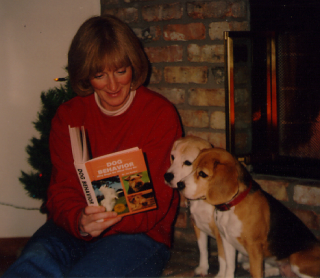Your Education About Puppy Education

Sadly, the majority of puppies fail to live long enough to enjoy their second birthday. They suffer from the terminal illness of being unwanted — failing to live up to the expectation of the Lassie–Benji–Eddie dream. Instead they develop a number of extremely common and utterly predictable behavior, training, and temperament problems and are surrendered to animal shelters to play lotto with their lives. Many people blame irresponsible ownership for this tragic situation. I would simply cite lack of know-how. Most prospective puppy owners are simply unaware of the problems that lie ahead and unfortunately, they have little idea how to prevent or resolve them. Ironically, the demise of many dogs stems from novice owners following misleading, erroneous, and in some cases downright bad advice from out-of-date training books.
If you have your heart set on raising and training a puppy, do make sure you train yourself beforehand. Remember, it takes only a few days to ruin an otherwise perfect puppy. Without a doubt, the most important developmental deadline comes before you even think of getting your puppy — your education about puppy education!
Many first-time puppy owners are surprised when they discover their new companion bites, barks, chews, digs, and marks the house with urine and feces. Yet these are all perfectly normal, natural, and necessary doggy behaviors.
Your canine newcomer is just itching to learn human house manners. He wants to please, but he needs to be taught how to please. It's no good keeping house rules a secret. Somebody has to tell the puppy. And that somebody is you.
Puppy Pointers
Whether selecting your prospective pup from a professional breeder or from a family breeding a litter for the very first time, the criteria are the same. Look for puppies raised indoors around human companionship and influence — specifically around people who have devoted lots of time to the puppies' education.
Your puppy needs to be prepared for the clamor of everyday domestic living — the noise of the vacuum cleaner, pots and pans dropping in the kitchen, football games screaming on the television, children crying, and adults arguing. Exposure to such stimuli while his eyes and ears are still developing allows the puppy (with his blurred vision and muffled hearing) to gradually become accustomed to sights and sounds that might otherwise frighten him when older.
Avoid pups that have been raised in an outdoor run or kennel. Remember, you want a puppy to share your home, so look for a puppy that has been raised in a home. Basement- and kennel-raised puppies are certainly not pet-quality dogs. They are "livestock" on par with veal calves and battery hens. They are neither housetrained nor socialized, and they do not make good companions. Look for litters that have been born and raised in a kitchen or living room.
Choosing a breed is a very personal choice — your choice. But you will save yourself a lot of unnecessary problems and heartbreak if your choice is an informed and educated one. Choose the breed you like, investigate breed-specific qualities and problems, and then research the best way to raise and train your pup. Make sure you test-drive several adult dogs of your selected breed or type before you make your final choice. Test-driving adult dogs will quickly teach you everything you need to know about a specific breed. Test-driving adult dogs will also pinpoint gaps in your education about dog behavior and training.
Regardless of your choice, please do not kid yourself that you will get a "perfect" adult dog simply by selecting the "perfect" breed and the "perfect" individual puppy. Any puppy can become a marvelous companion if appropriately socialized and trained. And, no matter what the breed or breeding, any puppy can also become a doggy delinquent if not properly socialized and trained. Please make an intelligent, researched choice when selecting your puppy, but remember: appropriate socialization and training is the single biggest factor determining how closely the dog will approach your view of perfection in adulthood.
No matter your eventual choice — success or failure is entirely in your hands. Your puppy's behavior and temperament now depend completely on good husbandry and training.
Your puppy's living quarters need to be designed so that housetraining and chewtoy-training are errorless. Each mistake is a potential disaster, since it heralds many more to come.
Long-term confinement prevents your puppy from learning to make mistakes around the house, and allows your puppy to teach himself to use an appropriate toilet, to settle down quietly and calmly, and to want to chew appropriate chewtoys. Confinement with chewtoys stuffed with kibble and treats teaches your puppy to enjoy his own company and prepares him for those times when he might be left at home alone.
Short-term close confinement also prevents your puppy from learning to make mistakes around the house, while allowing your puppy to teach himself to settle down quietly and calmly, and to want to chew appropriate chewtoys. Additionally, short-term confinement enables you to accurately predict when your puppy needs to relieve herself, so that you may take your puppy to an appropriate toilet area and reward her for using it. The knack of successful housetraining focuses on being able to predict when your puppy "wants to go."
Without a doubt the most important developmental deadline comes before you even begin your search for a puppy: namely, your education about puppy education. Just as you would learn how to drive before setting off in a car, you should learn how to raise and train a puppy before you get one.
Some owners want heaven and earth from their pups; others only demand magic and miracles. Owners want the puppy to be perfectly well-behaved and to amuse herself when left at home alone for hours on end. And they assume the pup will magically grow up to act this way without guidance. It is simply not fair to keep house rules a secret from your puppy, only to moan and groan when she predictably finds doggy ways to entertain herself and break rules she didn't even know existed. If you have house rules, somebody needs to teach them to the puppy. And that somebody is you.
Luckily, dogs have their natural activity peaks at dawn and dusk, so many are quite happy to settle down and snooze the day away. However, some dogs are not. Some dogs are simply more active than others, and when left at home alone become exceedingly stressed and may destroy the house and garden in the space of a day.
Puppy owners are often surprised when their new puppy bites, barks, chews, digs, and decorates the floors with urine and feces. Yet this is what dogs do. How did you expect your dog to communicate? To moo? To meow? And what did you expect your dog to do to pass the time of day? Housework? To mop and clean floors and dust the furniture? Or to amuse herself reading books, watching television, or doing crosswords?
Many owners appear to be at a further loss when confronted by utterly predictable problems, such as jumping up, pulling on-leash, and expressing the boundless energy and exuberance accompanying doggy adolescence. Additionally, owners are incredulous if their adolescent or adult dog bites or fights. When dogs are undersocialized, harassed, abused, frightened, or otherwise upset, what do we expect them to do? Call a lawyer? Of course they bite! Biting is as normal an ingredient of canine behavior as wagging the tail or burying a bone.
Before inviting a puppy to share your life, surely it is only wise and fair to find out beforehand what you might expect from a normal developing puppy, which behaviors and traits you might consider unacceptable, and how to modify the pup's inappropriate behavior and temperament accordingly. Specifically, owners need to know how to teach the youngster when to bark, what to chew, where to dig, where to perform his toilet duties, to sit when greeting people, to walk calmly on-leash, to settle down and shush when requested, to inhibit his otherwise normal biting behavior, and to thoroughly enjoy the company of other dogs and of people, especially men, strangers, and children.
Adapted from BEFORE You Get Your Puppy by Dr. Ian Dunbar




